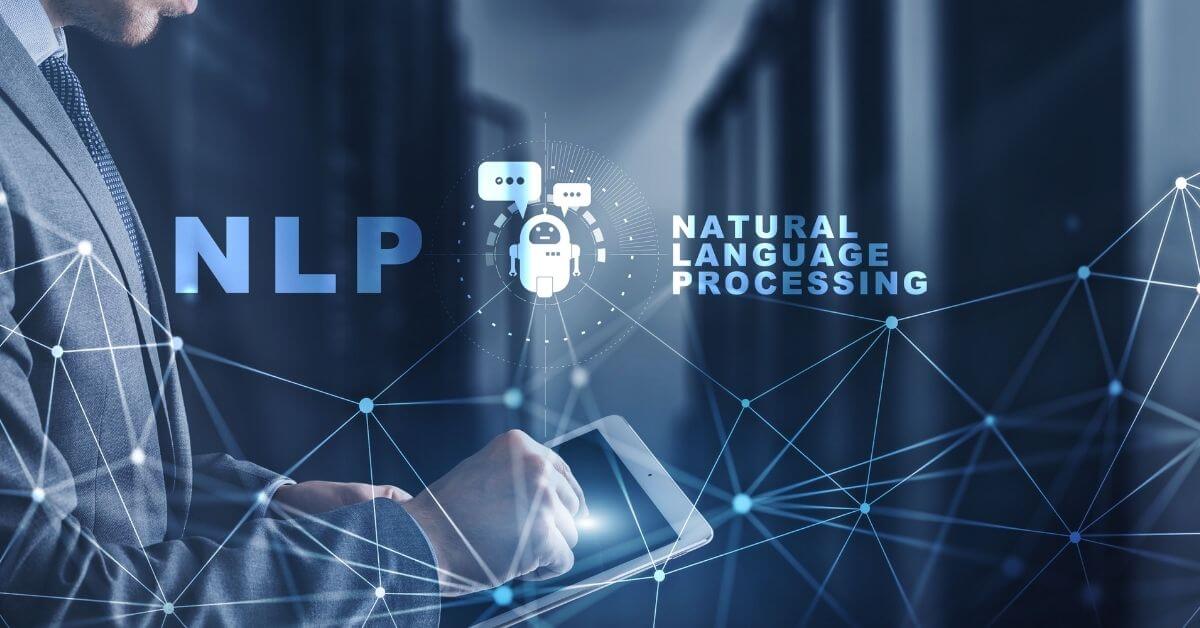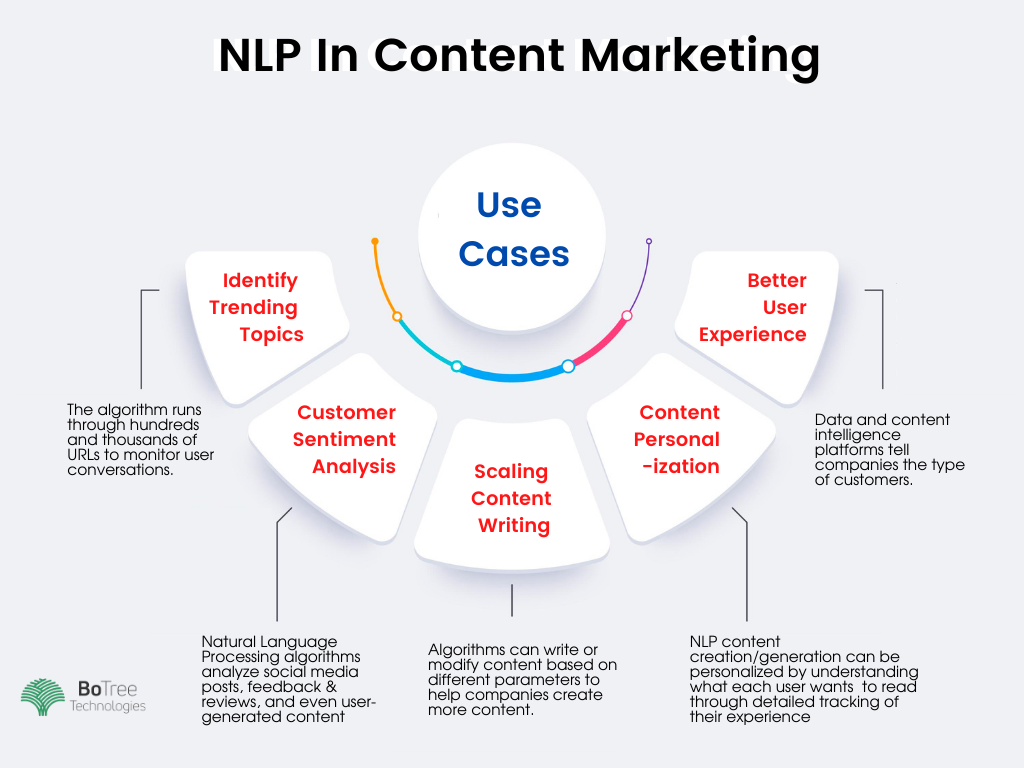
How is Natural Language Processing Useful in Content Marketing?
Natural Language Processing or NLP is an advanced implementation of Artificial Intelligence. It focuses on analyzing and processing natural language using AI and Smart Algorithms. The prime examples of NLP technology are virtual assistants like Siri and Alexa. They create an environment for human-like conversations – one of the many natural language processing applications.
It is estimated that the global NLP market will become 14 times larger in 2025 as compared to 2025. The market size is expected to reach $43 billion. The use of NLP in Machine Learning / Artificial Intelligence will drive maximum growth.
Natural Language Processing has Use Cases that Serve Multiple Industries. These include –
- Predictive text
- Language translations
- Virtual assistants
- Text processing
- Data analytics
- Text filtration
- Smart Search
Google translate uses NLP to translate languages instead of word-to-word translation. Word processors use Natural Language Processing to check grammatical accuracy. Customer service centers use NLP in chatbots to revert to common queries. The use cases of NLP are all around the world.
Whether it’s NLP in healthcare, insurance, banking, automobile, or education, the use of NLP in business is increasing twofold. The latest entrant to this list is the content marketing industry.
Read More: Unlocking the Power of Data And AI for Businesses
What is NLP in Content Marketing?
NLP in marketing, especially content marketing, is seeing tremendous growth. It impacts the kind of content that companies create and how they create it. The technology helps us to understand the context of certain keywords, content, and why people read the content they read.
Let us look at an example – the sentimental analysis capabilities of NLP enable companies to identify the sentiments around their brand. When people talk about a product on social media, the NLP algorithm analyzes that sentiment, allowing companies to determine where they should focus their marketing efforts. Several companies provide NLP and AI services for sentiment analysis in multiple industries.
Checkout: 5 Ways Machine Learning (ML) Can Improve Your Business
The Use Cases of NLP in Content Marketing
Natural Language Processing content and digital implementation focuses on identifying why people read content, what type of content to create, and how to get the best outcomes from that content.
NLP overall focuses on how to deliver a personalized marketing experience to each targeted user. Through NLP, companies can understand user behavior, their preferences, and what makes them click on certain content.

Here’s how Natural Language Processing Techniques Help in Content Marketing –
- Identify Trending Topics
- An important benefit of AI and Natural Language Processing in content is identifying trending topics online. The algorithm runs through hundreds and thousands of URLs to monitor user conversations on social media and websites to identify what everyone is talking about.
- A similar algorithm is created for IMMEDIA by BoTree Technologies. The algorithm parses through thousands of URLs and identifies the type of topics that are prevailing based on the keywords. It gives the company a competitive edge by delivering content that most readers want to see.
- Customer Sentiment Analysis
- Probably one of the biggest outcomes of NLP research in content marketing is sentiment analysis. Natural Language Processing algorithms analyze social media posts, feedback & reviews, and even user-generated content to identify what customers feel about a product or topic.
- Tools like Monkeylearn, Lexalytics, Brandwatch, and Social Searcher are a few examples of sentiment analysis tools that help companies understand what their customers think and feel about their products.
- These tools are rule-based, automatic algorithms to understand the sentiment surrounding a topic. Several politicians use these tools to listen to what people are saying about them during elections. An AI development company can build sentiment analysis algorithms based on what companies want to listen to.
- Scaling Content Writing
- Often, companies need a lot of content to improve engagement and become visible to customers. NLP content writing enables them to create a lot of content through AI and NLP software. Algorithms can write or modify content based on different parameters to help companies make more content.
- One such example is when companies want to add backlinks to certain articles and publish them on third-party websites. This content can be generated by robots.
- Another example is when companies need to write thousands of product descriptions on their e-commerce store. (NLP) Natural Language Processing techniques in content marketing reduce the time it takes to write such descriptions.
- Content Personalization
- A tricky implementation of NLP in marketing and content creation is personalization. NLP content creation/generation can be personalized by understanding what each user wants to read through detailed tracking of their experience on the website.
- For example – NLP tracking algorithms can track what parts of the content users highlight, scroll the most, and stay at for a longer period of time. When the frequency is high, content writers can create articles that match those criteria – leading to more relevant audiences reading the content.
- Target content increases the ROI of the entire content marketing efforts. NLP algorithms can also suggest personalized content based on location, demographics, and other parameters.
- Improving User Experience
- User experience is the key in content marketing – just like every other industry. Data and content intelligence platforms tell companies what type of customers are reading their content, their interests, locations, etc. It helps to create specific content that delivers a better user experience.
- User experience also improves when customers get what they want through search results. It involves using NLP research to find keywords that match the user intent and deliver the best search results.
The Big Secret Benefit – NLP in User Journey Tracking
Apart from everything mentioned above – there’s one thing that Natural Language Processing can be used for maximum returns. NLP algorithms can help companies make meaning of the entire journey of every user – their web search query, which page they landed on, what content they consumed, social media posts they engage with, reviews & feedback, etc.
Identifying the user journey gives companies an exact idea about the following things –
- The kind of content to deliver at each stage
- The platforms where content should be delivered
- The content they need to improve and update
- The type of things people say about them
- The search queries that people associate them with most
Checkout: Case Study on Twitter Sentiment Analysis: Analysis using AI & NLP
Summing Up
Natural Language Processing provides content marketers insights into what their customers are looking for. Content is the cornerstone of every digital marketing activity. We understood the use cases of NLP in content marketing, which include sentiment analysis, identifying trending topics, and creating content through robots.
Finally, we looked at the big secret of NLP in content marketing – the tracking of the user journey. When companies can track what type of content their users engage with and where the returns on content marketing efforts multiply twofold.
Natural Language Processing in content marketing will ensure that content is aligned with business goals. For this, companies need to hire a custom software development company like BoTree Technologies that can build NLP and Machine Learning solutions to meet the changing needs in content marketing.
Contact us today for a FREE CONSULTATION.




